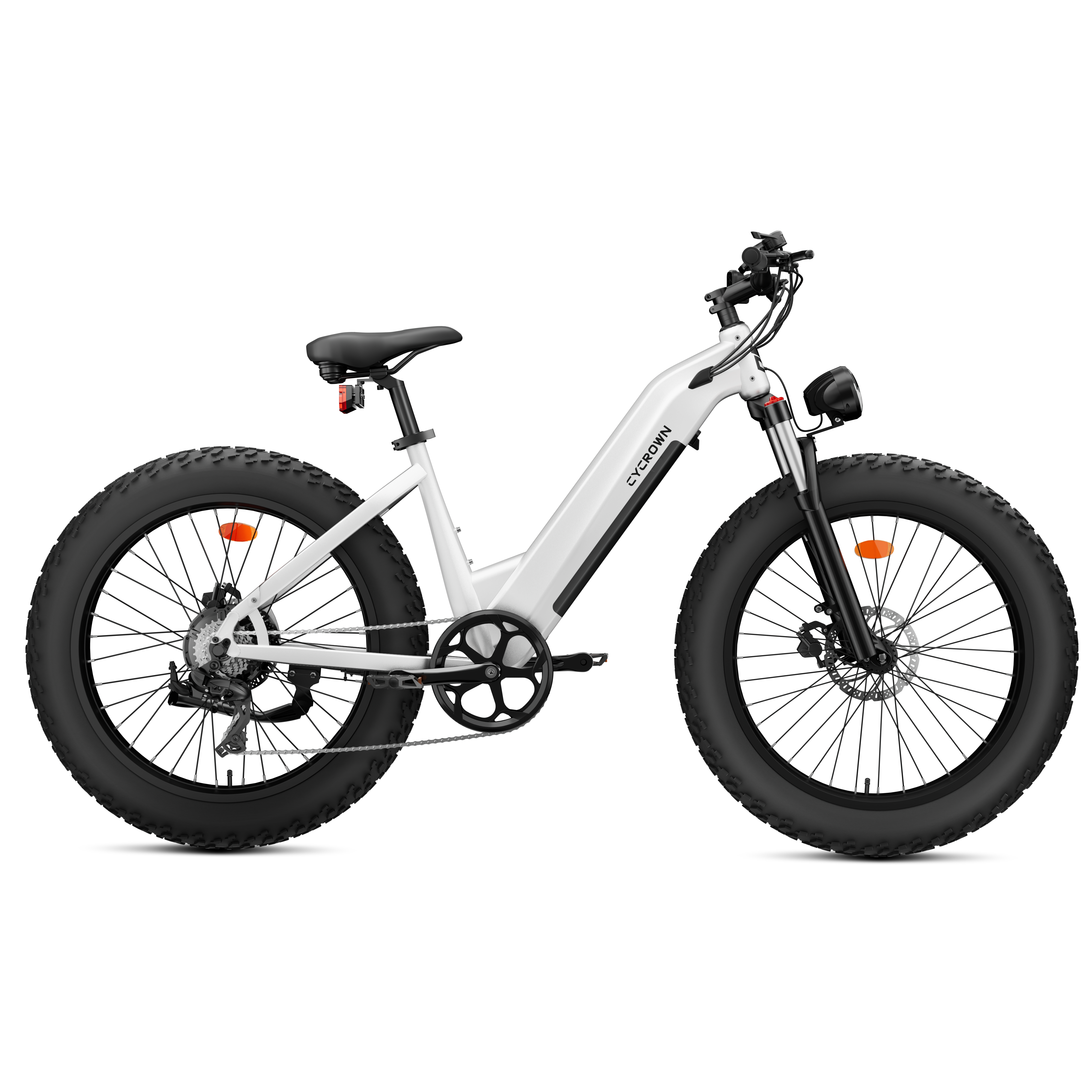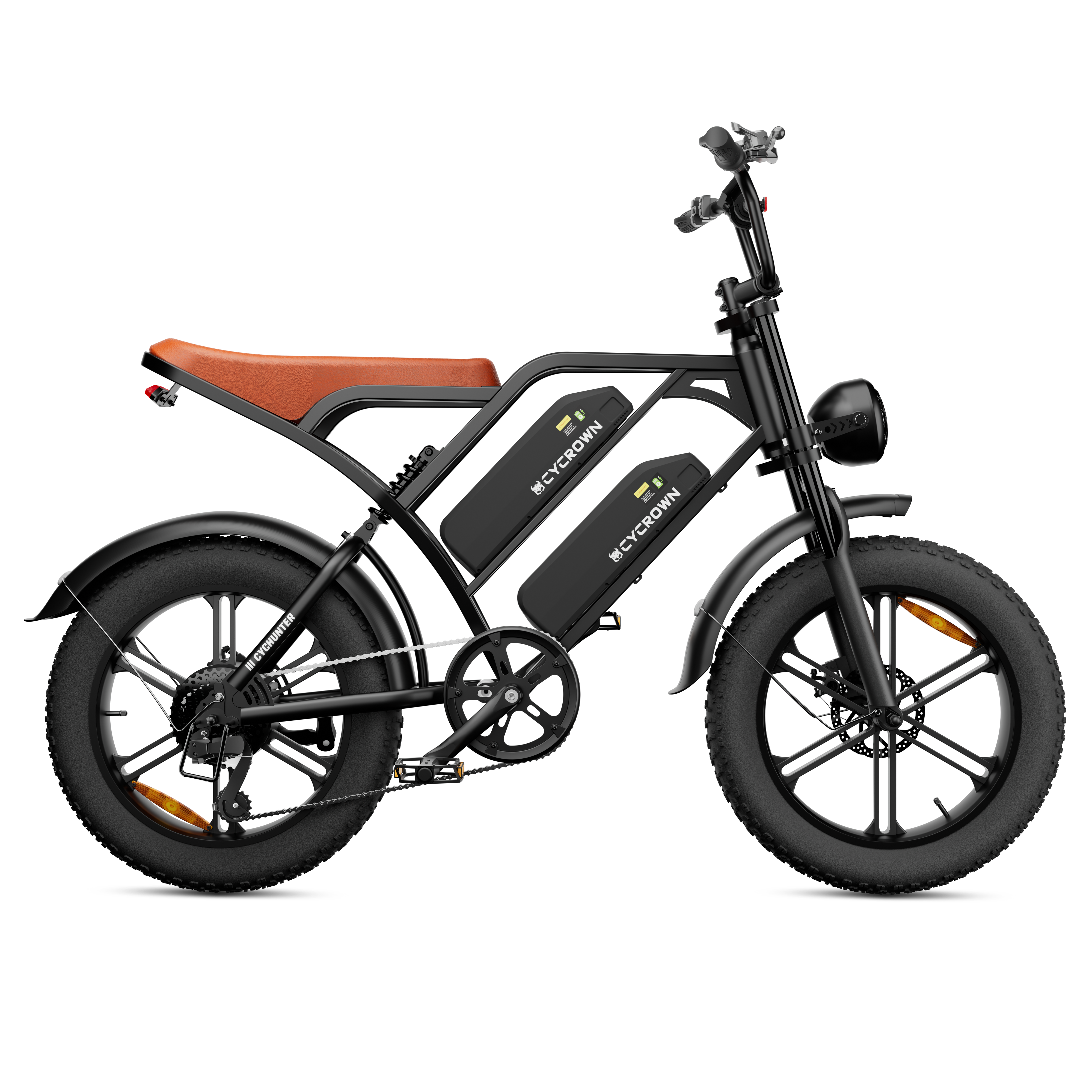When it comes to optimizing the performance of your electric bike, one of the most crucial decisions you'll make is choosing the right battery. The question, What Size Battery is Best for Your Electric Bike, is not just about battery dimensions; it's about understanding the delicate balance between range, weight, cost, and power.
Selecting the ideal ebike battery size can transform your e-bike experience, ensuring you have enough juice for long rides while keeping your bike agile and responsive.
In this article, we'll guide you through the factors that influence battery size choice and help you make an informed decision for a smooth and efficient ride. Whether you're a daily commuter or a weekend trail explorer, knowing the ins and outs of e-bike batteries is key to unlocking the full potential of your electric two-wheeler.
Understanding Electric Bike Batteries

When it comes to electric bikes, the battery is one of the most important components. It's what powers the motor and allows you to ride without pedaling. In this section, we'll take a closer look at the different types of e-bike batteries, how battery size affects performance, and other important considerations.
Types of E-Bike Batteries
There are several types of batteries used in electric bikes, but the most common are lithium-ion, lead-acid, and nickel-cadmium.
- Lithium-ion batteries are the most popular choice for electric bikes because they are lightweight, have a high energy density, and are relatively long-lasting.
- Lead-acid batteries are less expensive but are heavier and have a shorter lifespan.
- Nickel-cadmium batteries are rarely used in electric bikes due to their low energy density and high toxicity.
Battery Capacity and Energy Density
The capacity of an electric bike battery is measured in watt-hours (Wh), which is the amount of energy the battery can store. The higher the watt-hour rating, the longer the battery will last. However, a higher capacity battery will also be heavier and more expensive.
Energy density is another important factor to consider when choosing an e-bike battery. This refers to how much energy can be stored in a given volume or weight of the battery. A battery with a higher energy density will be smaller and lighter than a battery with a lower energy density.
Voltage and Its Impact on Performance
Voltage is another important consideration when it comes to e-bike batteries. The voltage of a battery determines how much power it can deliver to the motor. A higher voltage battery will provide more power and better performance, but it will also be more expensive. However, it's important to note that a higher voltage battery will also have a shorter lifespan than a lower voltage battery.
Battery Life and Charge Cycles
The lifespan of an e-bike battery depends on several factors, including the type of battery, its capacity, and how it's used. Most lithium-ion batteries will last between 500 and 1000 charge cycles, while lead-acid batteries may only last for 300 cycles.
It's important to follow the manufacturer's recommendations for charging and discharging the battery to ensure the longest possible lifespan. Avoid fully charging and discharging the battery, and try to keep the battery between 20% and 80% charged for optimal performance and longevity.
Also check out: Dual Battery E-Bikes
Factors to Consider When Choosing a Battery Size

Choosing the right battery size for your electric bike is crucial to ensure the optimal performance and range of your ride.
Here are some factors to consider when selecting the ideal battery size for your e-bike:
1. Range Requirements
One of the most important factors to consider when choosing a battery size is your range requirements. The battery size directly affects the distance your electric bike can travel on a single charge. The larger the battery size, the greater the range you can achieve. It is essential to choose a battery size that can meet your range requirements to avoid running out of power during your ride.
2. Bike’s Power and Motor Efficiency
The type of motor on your electric bike also influences the optimal battery size. For instance, a mid-drive motor is generally more efficient than a hub motor, which means it may require a smaller battery size to achieve the same range. It is essential to consider your bike’s power and motor efficiency when selecting the ideal battery size.
3. Terrain and Riding Conditions
The terrain and riding conditions also play a crucial role in determining the ideal battery size for your electric bike. Uphill and challenging terrains demand more from a battery, and a larger battery size may be necessary to achieve the desired range. Similarly, riding in extreme temperatures or windy conditions may also affect the battery’s performance and range.
4. Weight and Portability
Another factor to consider when selecting the ideal battery size is the trade-off between battery size and weight. Larger batteries generally weigh more, which may affect the handling and portability of your electric bike. It is essential to strike a balance between battery size and weight to ensure optimal handling and portability.
Comparing Battery Sizes of Electric Bike

The most important of these factors is the battery's capacity, which is typically measured in watt-hours (Wh) or ampere-hours (Ah). Some popular battery sizes include 400 Wh, 500 Wh, and 700 Wh, each with its own set of advantages and disadvantages.
400 Wh Battery
A 400 Wh battery is a good choice for those who plan to use their electric bike for short commutes or leisurely rides. This battery size is lightweight and compact, making it easy to install and remove. It's also affordable, making it a great option for those on a budget. However, a 400 Wh battery may not provide enough power for longer rides or hilly terrain.
500 Wh Battery
A 500 Wh battery is a popular choice for most electric bike riders, as it strikes a balance between power and affordability. This battery size is suitable for both short commutes and longer rides, making it a versatile option. It's also relatively lightweight and compact, making it easy to handle. However, a 500 Wh battery may not be powerful enough for steep hills or heavy loads.
700 Wh Battery
A 700 Wh battery is the largest and most powerful option available for electric bikes. This battery size is ideal for riders who plan to take long rides or tackle steep hills. It provides plenty of power and range, making it a great option for touring or commuting. However, a 700 Wh battery is also the heaviest and most expensive option, making it less suitable for those on a budget or those who prioritize portability.
What is a Good Ebike Battery Size?
A good range for voltage is between 36-52V, depending on your needs.
The size of the battery will impact the range and power of your bike, as well as its overall weight and handling.
One important factor to consider is the voltage of the battery. Higher voltage batteries will provide more power and range, but they will also be heavier and more expensive.
Another factor to consider is the capacity of the battery, which is measured in watt-hours (Wh) or ampere-hours (Ah). A higher capacity battery will provide more range, but it will also be heavier and more expensive.
A good range for capacity is between 250Wh - 1000Wh, depending on your needs.
Taka a look at this collection of long range e-bikes.
E-bike Battery Maintenance Tips

Maintaining your e-bike battery is crucial to ensure its longevity and performance. Here are some tips to help you maintain your battery health and extend its lifespan:
Charging Practices
- Always use the charger provided by the manufacturer to charge your battery. Using a different charger can damage your battery and reduce its lifespan.
- Avoid overcharging your battery. Once it's fully charged, unplug it from the charger. Overcharging can lead to overheating and, in some cases, cause your battery to explode.
- Don't let your battery completely drain before recharging it. Maintaining a charge between 20% and 80% is ideal for daily use. Deep discharging your battery below 20% before each recharge can age your battery faster.
- If you're planning to store your e-bike for an extended period, charge your battery to around 60% before storing it. This will help prevent the battery from fully discharging and losing its charge.
Battery Maintenance
- Regularly clean the battery contacts with a dry cloth to ensure a good connection between the battery and the bike.
- Store your battery in a cool, dry, and well-ventilated place away from direct sunlight, heat, and moisture.
- Avoid exposing your battery to extreme temperatures, such as leaving it in a hot car or outside in freezing weather. Extreme temperatures can harm your battery and reduce its lifespan.
- If you're not planning to use your e-bike for an extended period, charge your battery to around 60% and remove it from the bike. Store it in a cool, dry, and well-ventilated place away from direct sunlight, heat, and moisture.
Conclusion
In conclusion, choosing the right battery size for your electric bike is crucial for optimal performance and longevity. It's essential to consider your riding style, expected distances, and terrain challenges when selecting an ebike battery.
As we have seen, the ideal battery size for an electric bike is one that aligns with your personal needs and bike specifications. A battery within the 400Wh to 700Wh range often offers a suitable balance for various needs, providing enough power for extended rides without excessive weight.
Remember that battery size is not the only factor to consider when selecting an electric bike. Other factors like motor power, voltage, and range also play a significant role in determining the overall performance of your ebike.
It's important to learn about your options and get advice from experts. Cycrown knows a lot about e-bike batteries and offers good electric bikes. Talking to them can help you find a battery that fits your bike well and works great for your rides.
Related Posts:
- Ebike vs Motorcycle: Understanding the Differences
- How to Choose a Bike Helmet: A Complete Buyer’s Guide for 2024
Frequently Asked Questions
Does a bigger battery mean more power on an ebike?
Not necessarily. A bigger battery means more energy storage capacity, which can translate to longer range and more time between charges. However, the power output of an electric bike is determined by the motor, not the battery. A larger motor can provide more power, but it will also consume more energy and drain the battery more quickly.
What is the most common e-bike battery?
Currently, the most common e-bike batteries are rated at 10.4Ah, 11.6Ah, 14Ah, 21Ah, and 25Ah. The Ah rating refers to the battery's capacity to store energy, and a higher rating generally means a longer ride per charge. However, the actual battery life per charge also depends on motor usage, road and weather conditions, among other factors.
Do all electric bikes use the same battery?
No, electric bikes can use different types of batteries, including lithium-ion, lead-acid, and nickel-metal hydride. Lithium-ion batteries are the most common and offer the best performance in terms of energy density, weight, and lifespan.
How long does a standard e bike battery last?
The lifespan of an e-bike battery depends on several factors, including its quality, usage, and maintenance. On average, a good quality lithium-ion battery can last between 500 and 1000 charge cycles, which translates to about 2 to 5 years of regular use. However, some batteries can last longer or shorter depending on their specific design and usage.
Do all Ebikes use lithium batteries?
No, not all e-bikes use lithium batteries. Some e-bikes use other types of batteries, such as lead-acid and nickel-metal hydride. However, lithium-ion batteries are the most common and offer the best performance in terms of energy density, weight, and lifespan.










